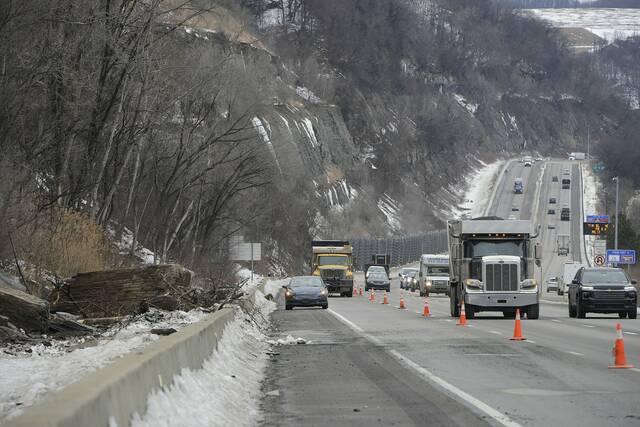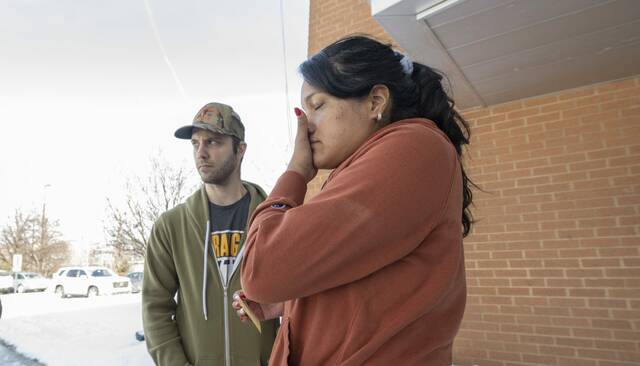Pittsburgh Controller Rachael Heisler on Wednesday reiterated concerns about what she views as the city’s fragile financial position as she unveiled her office’s annual report on Pittsburgh’s revenues and expenses.
The controller has raised alarms that the city is spending more than it brings in, a problem that is coming to the forefront as federal American Rescue Plan Act dollars, meant to buoy local economies through the covid-19 pandemic, dry up in the coming years.
Heisler on Wednesday said it would be “unrealistic” for the city to continue spending at its current pace without bringing in additional revenue.
“Expenditures are outpacing revenues. Period,” she said.
Former city Controller Michael Lamb last year reassured Pittsburghers in the annual financial report that the city was in a stable financial position after weathering the harshest impacts of the pandemic. The city’s finances have seen additional challenges since then, Heisler said.
She pointed to a $21 million budget shortfall in deed transfer tax revenue last year, legal challenges that could stop the city from collecting its facility usage fee and a decrease in Downtown property values, which translates to less real estate tax revenue.
About a quarter of the city’s property tax base is within the Golden Triangle, an area that has seen significant changes since the covid-19 pandemic spurred a widespread shift to remote work and largely emptied office spaces in downtowns across the country.
The comprehensive financial report pointed out 10 of Pittsburgh’s landmark Downtown buildings — U.S. Steel, PPG Place, PNC Plaza, Three Gateway, the Union Trust Building, PNC Firstside, Two PNC Plaza, the K&L Gates Center, 525 William Penn Place and 11 Stanwix Street — have seen reassessments that resulted in a decrease of almost $3 million in tax revenue.
Heisler said city officials had anticipated a drop in Downtown property taxes and budgeted for less real estate tax revenue, but the situation has grown worse than expected.
“We are dipping lower than we anticipated,” she said.
Heisler has encouraged city officials to reopen the budget to more accurately reflect the revenues the city is projected to bring in this year.
She also has encouraged officials to begin conversations with city residents about how the city’s precarious financial position could impact city services.
Last year, the city saw an 8.6% increase in revenues from the previous year and a 10.4% jump in expenditures, Heisler said. The city, she said, cannot continue that trend.
The jump in expenses comes, in part, from the city hiring new workers after a hiring freeze implemented in 2020 and 2021 in response to the pandemic.
The city’s budget anticipates a deficit in 2025 and 2026, in part because the city will have to make increased bond payments that were deferred during the pandemic. There also is an anticipated deficit in 2028.
Heisler said the city’s budget plans for a 75% cut to its paving expenditures in the next three years.
She said “everything should be on the table” in terms of potential solutions, including turning to the city’s tax-exempt nonprofits for payments in lieu of taxes, often known as PILOTs, to bolster the city’s revenues. Growing the regional economy and expanding the city’s tax base also would alleviate many of the city’s financial challenges, she said.
The city needs to be “practical about staffing” and look at each of its expenditures to determine which expenses are necessary, Heisler said.
The controller said she would not support slashing services in the Department of Public Works or the Department of Public Safety but said there might be other programs where cuts could be considered. The controller’s office does not set the city’s budget, which is proposed by the mayor’s office and approved by City Council.
Jake Pawlak, director of the Office of Management and Budget, said the administration of Mayor Ed Gainey is confident it will be able to maintain its current staffing and spending.
Pawlak struck a more optimistic tone than did the city controller about Pittsburgh’s financial future. The administration does not anticipate ending 2024 in a deficit, Pawlak told reporters Wednesday, and it does not see the need to change its budgeting and expenditures this year.
Pawlak said officials will “closely scrutinize” any increases in 2025 spending.








